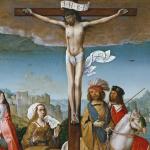
The Parable of the Talents is the story of a lazy slave who buries the talents (think “a lot of money”) his Master gives him and receives exactly what an insolent and do-nothing slave deserves: a demeaning lecture and getting booted to the dark edges of society where he will suffer greatly for his poor stewardship of his master’s money.
If you don’t hear in that parable the echoes of the GOP’s perspective about food stamps, universal health care and pretty much anything else that takes care of those in need at the cost of the larger society, I have to believe you weren’t paying attention.
In conservative circles there is an almost obsessive concern with “lazy” people taking advantage of the system and getting their basic needs met at the expense of others.
If I didn’t know better, I’d believe that the parable of the talents is the foundation upon which the modern day GOP platform is built.
It’s the story of the rich getting richer and the poor getting poorer. Verse 29 reads, “For to all those who have, more will be given, and they will have an abundance; but from those who have nothing, even what they have will be taken away.” If I weren’t already familiar with that verse I’d think that it was from some new, twisted and perverted rewrite of the Bible that was funded by the Koch brothers.
The Koch brother klan must LOVE this piece of scripture.
Unfortunately, loving it because of its condemning of the “lazy” slave, completely misses the point of the parable.
For these pieces of scripture to condemn the slave, you have to read them out of context. You have to completely ignore the fact that five short verses later Jesus says, “…for I was hungry and you gave me food, I was thirsty and you gave me something to drink, I was a stranger and you welcomed me.” You have to ignore that Jesus concludes that lesson with these words, “Truly I tell you, just as you did not do it to one of the least of these, you did not do it to me.”
Those lines are the morals of the stories, the parables, Jesus just told. So ask yourself, who in the parable is the least of these, the marginalized?
Let me help you by sharing verse 30 from this parable, “As for the worthless slave, throw him into the outer darkness, where there will be weeping and gnashing of teeth.”
It’s the third slave – he is the least of these, the marginalized.
“Truly I tell you, just as you did not do it to one of the least of these, you did not do it to me.”
The Parable of the Talents is not a condemnation of the third slave, it is a condemnation of the master.
That’s right, the master is not God.
The master is us, those with power – including the middle class in America.
Every time we live into our positions of power and then judge those who are struggling on what we see as the margins of society, the master is us. Every time we assume a right to our privileges and label those without those same privileges as “lazy,” the master is us. Even when our places of prerogative are so endemic that we live into the abuse they cause by carelessly supporting the slave labor required to provide the goods we want at rock bottom prices, the master is us.
Yes, it is the master that is being condemned here and, along with him, the words he speaks: “For to all those who have, more will be given, and they will have an abundance; but from those who have nothing, even what they have will be taken away.”
You see Jesus doesn’t say, “Just as you did not do it unto one of the more productive of least of these, you did not do it unto me.”
The Parable of the Talents is the parable of a “master” whose place of power gets in his way of understanding Jesus’ core lesson. This parable is the story of a “slave” who is willing to risk everything, even in the face of fear, to the point of being shunned to the dark corners of society for the sake of standing up to abusive power systems by simply being unwilling to participate in them.
In many ways, there is great humor in the how they are labeled. The master is truly a slave to a system that suggest he is more powerful and more deserving than the “slave.” So much so that he somehow believes it is a good thing to call attention to the fact that he “reaps where he does not sow.”
The slave, on the other hand, while still a slave to his circumstances and the brutal “power” of the master, is the master of his own response to the power structure that instills fear into those who have little established power within the system. He confronts the system and its representative, the master – us.
This is a parable that confronts the masters of the world. It confronts those who have plenty and want more. It confronts those who assume some right to what they have because of their social position. It confronts those who believe the privileged places they were born into makes them more deserving than those who weren’t. It confronts those who believe they have what they have because they aren’t lazy like the people who don’t have it.
This is a parable that the GOP should hate.
The Koch klan who are hellbent on ushering the world’s newest oligarchical society, should fear the comeuppance encouragement offered to the least of these in this text. The “get your hands off my stuff” perspective of the Tea Party should tremble at the judgment this parable places on those who only focus on their own wealth and interests.
This is a text of equality. It is a story of resistance, of facing down the powers that be by refusing to participate in the system of dominance.
Yes, we are the master, but we are the third slave as well. This is our story. It is a call to arms, an encouragement, in the face of the one percent whose money is taking over the country.
The question is, are we willing to let go of the fear? Are we willing to live into the story of the third slave who confronted the powers that be? Are we willing to risk what little we have in order to confront the system that marginalizes us all?
Here more thoughts on this parable on this week’s Moonshine Jesus Show’s Distilling the Gospel:
Consider supporting Mark’s blogging. Help create a market for Progressive Christianity. Not through big publishers or big denominations, but through the grassroots. We need to encourage the growth of progressive Christian voices in the marketplace. Even a dollar will help.
Facebook continues to make it increasingly difficult for me to let you know about new blog posts like this. Please consider signing up for my mailing list where we can insure you are notified. Just click here!
Mark is a co-founder of The Christian Left. Come and join the conversation!
















